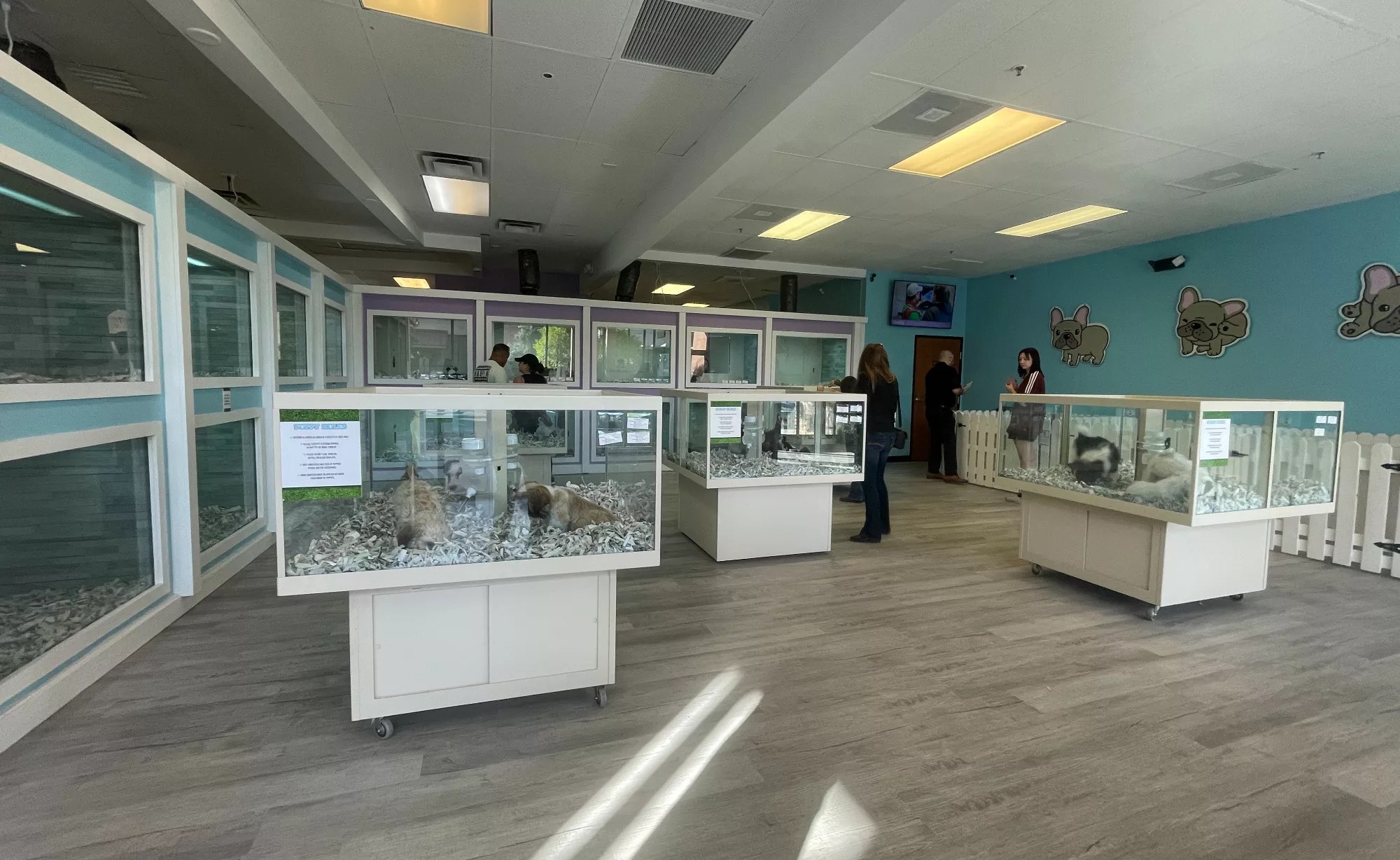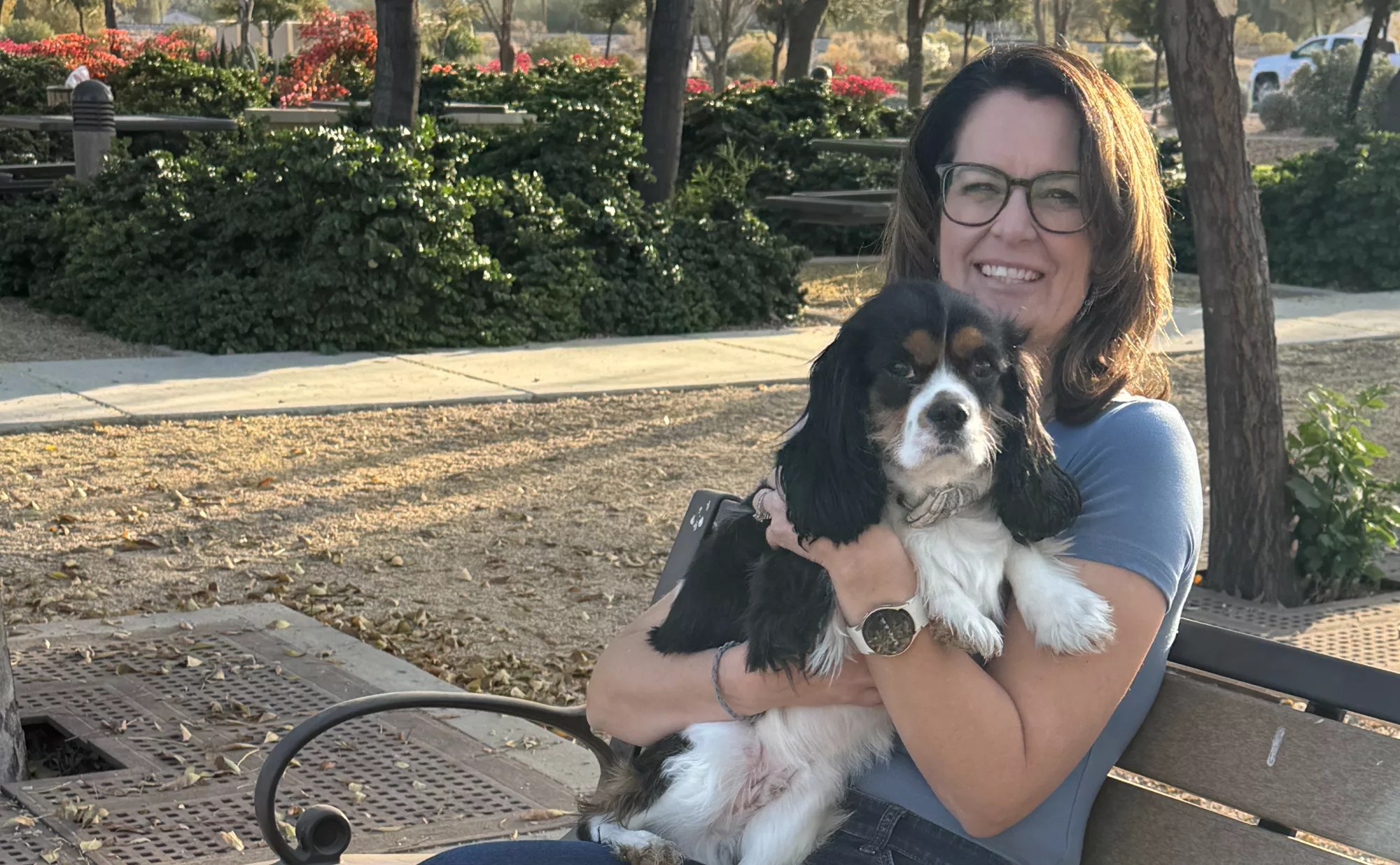
New Times photo-illustration, photos via Adobe/Getty Images

Audio By Carbonatix
After she was diagnosed with brain cancer, Rachel Duffell was looking for a medical alert dog. In August 2023, the Queen Creek resident found one at Puppyland, a pet store in Tolleson.
Puppyland – a chain with two locations in Arizona and more in Texas, Idaho and Washington – provided clean medical records for the dog, a 10-week-old Cavalier King Charles spaniel that Duffell named Archie Styles. Archie Styles also came with a warranty, an additional protection to put Duffell’s mind and pocketbook at ease.
Things with Archie Styles have not gone as hoped, however. The dog wound up costing Duffell thousands of dollars in medical expenses, she said, which she’d had to fight Puppyland to cover. While Duffell’s prognosis is promising – after surgery and recovery, her last MRI showed no new tumors in her brain – the dog has continued to fight malady after malady.
Archie Styles became nearly immobile and unable to serve as a medical alert dog. Veterinarians told Duffell that Archie likely had morbidly deformed back legs due to a genetic condition, according to records Duffell provided to Phoenix New Times. Medical expenses for the dog cost Duffell more than $7,000 in vet bills in just a few months.
“He’s such a sweet, loving dog, and it’s not his fault that they’re inbreeding and hurting these puppies,” Duffell said, holding back tears. “What do I do? I committed myself to this dog, and I have to try to get him a better life.”
Duffell blames Puppyland, and she isn’t the only past customer with a grudge against the store. Other Arizona pet owners who purchased dogs from Puppyland reported similar issues to New Times.
They criticize the poor health of the animals Puppyland sells, the chain’s byzantine warranty claim process and a predatory loan arrangement that saddles pet owners with interest rates as high as 199% – the latter putting the pet store chain in the crosshairs of regulators in Washington state, though such loans remain legal in Arizona.
Kayla Kerr, a co-owner of the Puppyland chain, denied any wrongdoing to New Times. She said the chain provides payment plans to make purchasing a dog more accessible. Kerr added that warranty claims that are properly submitted according to contract instructions are paid out in full.

The interior of Puppyland’s store in Chandler.
Matthew Bird
How much (plus interest) for that doggy in the window
Kerr said she started Puppyland to innovate the industry and to give pet owners a trusted place to buy dogs.
Puppyland debuted its first store in Washington in 2018. It opened its Tolleson store in 2022 and a second Arizona location in Chandler last year. On its website, the company describes itself as “a pet store that offers purebred and designer breeds for sale with health guarantees.”
The Tolleson location seems attractive enough, with 4.8 stars on Google. But the Better Business Bureau gives it an F rating. One reason why: The chain pushes high-interest loans on customers.
Jenny Lunning purchased a French bulldog from Puppyland in 2023. She said she sought out the loan – the dog cost $5,000, which Lunning said is normal for that breed – but she was still shocked by how they pushed it on her and how much it ultimately cost.
“After the loan and everything, he ended up being closer to $7,000,” she said, “so we were caught off guard with that.”
Lunning pays $147.25 each month with a 49% interest rate, on the lower end of the rate range listed in Puppyland’s contracts. Based on her payment plan, she said it would take another three years to pay off the loan, though she intends to do so sooner. About half of her monthly payments go to the loan principal. The rest is paying off the interest.
Duffell also said Puppyland sales associates tried to get her to take out a loan. She repeatedly told them no, but they persisted. She held them off, paying for her puppy with cash and her credit card.
High-interest pet loans are not uncommon in the industry, though Puppyland’s have earned scrutiny. Kerr notes that the loans are provided not by Puppyland but instead by third-party lenders – Lending USA, EasyPay Finance and Credova Financial. “We don’t have any control over what terms and rates they offer,” she said. At least two of the lenders, EasyPay and Credova, have pockmarks in their histories.
Last year, Massachusetts Attorney General Andrea Campbell called EasyPay Finance loans “predatory” and reached an agreement with the company that it would stop operating in the state. Credova Financial – which primarily provides loans for guns and has Donald Trump Jr. on its parent company’s board, according to SEC filings – is facing penalties from the Consumer Financial Protection Bureau. It also was fined $50,000 by the California Department of Financial Protection and Innovation for its use of hidden fees.
Puppyland ran into its own legal issues over the loans in Washington state. In 2023, Washington Attorney General Bob Ferguson sued Puppyland for channeling consumers into predatory loans. The state alleged that Puppyland employees were rushing consumers into signing up for loans without giving them time to comprehend its terms.
According to the lawsuit, Puppyland sold a $5,900 dog to an 18-year-old who worked part-time at restaurants. Puppyland signed her up for two loans, “yet did not explain the loan terms or financial implications of stacking two loans,” the suit said. The two loans carried interest rates of 81% and 128%. Loan payments plus vet bills and other expenses “were the equivalent of nearly two weeks” of the woman’s salary, per the suit. “She lost her apartment as a result and was forced to live in a car with her puppy,” the suit said.
The company settled with the state in early 2023, not long before Washington Governor Jay Inslee signed a law banning financing for pets. The law also requires that puppies remain with their mother until 8 weeks of age, businesses to include prices and breeder information on advertisements, and breeders to be licensed under the U.S. Department of Agriculture.
Puppyland closed one of its locations in Washington and stopped offering “puppy payments” at its flagship store. Financing remains available at its two Arizona stores.
“Most customers pay in full,” Kerr said, “but for those that want to utilize financing options, they have access to their terms and rates to decide if they want to go through with the contract.”
On Jan. 2, after Kerr spoke to New Times, the Tacoma News Tribune reported that Puppyland had settled another lawsuit. The suit was brought by a woman who said she was pushed to take out a loan for a $6,000 Dachshund that died roughly a month after she bought it. Kerr had previously said the woman’s claims were false.

Rachell Duffell says she is still facing lots of medical expenses for the dog she bought from Puppyland.
Courtesy of Rachel Duffell
Sick puppies
“For 40 to 50 years, pet stores have been shady,” Kerr said. She aims to change that.
Kerr said Puppyland works to ensure the dogs it sells are healthy. It works “exclusively with responsible and licensed hobby breeders,” she said, and she and her team visit breeders from whom they purchase dogs. To increase transparency for pet buyers, Kerr’s stores feature TVs that play videos of breeding facilities that she and her videographer filmed.
She pushes her breeders to perform genetic testing to identify potential diseases in puppies. Kerr said only a small number of puppies arrive at the store with illnesses. When sick dogs do arrive, Puppyland keeps them in special isolation rooms. Veterinarians check the dogs at least twice before families take the animals home, in compliance with Arizona law.
Puppyland’s contracts include warranty protections. The company will reimburse customers up to 100% of the cost of the dog for vet visits related to viral infections contracted within 15 days of purchase. Customers also can get reimbursed for the value of their dog if a genetic disease or birth defect is identified within two years. Puppyland also offers a 10-year warranty that covers 50% of the cost of a new puppy if the first puppy dies from a life-altering congenital or hereditary condition diagnosed by a licensed veterinarian.
In the long run, Kerr said, it’s more cost-effective to buy a warrantied puppy from her than to chance a cheaper one from somewhere else.
“You could buy a puppy for $700 in a parking lot,” Kerr said. “But you may end up paying thousands of dollars in vet bills.”
Meanwhile, some customers say it’s agonizing to get the store to honor the warranties.
When Duffell learned her dog had a genetic issue, she knew her warranty covered congenital and hereditary issues discovered within two years of purchase. Yet whenever she called Puppyland, the call never went through. She said she eventually pursued legal mediation with Puppyland. Kerr disputes that, saying that no warranty cases have gone to mediation or arbitration.
Eventually, Duffell said, Puppyland reimbursed her $1,500 for her dog’s medical bills. She still needed to take on two extra jobs to pay for her dog’s medical debt and ongoing treatments, including physical therapy and a surgery.
Some owners said using the warranty requires a lengthy process filled with red tape. The warranty contract says buyers must submit warranty claims at puppylandarizona.com, while a different handout given to customers directs them to submit claims via a third-party website. On that third-party site, they communicate with claims specialists who require documentation of the illness and vet bills.
Lunning said she filed a claim after her dog was diagnosed with parvo, a highly contagious and potentially deadly virus that affects dogs. She said she repeatedly emailed the company for months and threatened to sue Puppyland before the company finally reimbursed her for $200 of the $1,000 out-of-pocket costs for the dog’s medical bills.
The warranty contract also states that when puppies die, owners have just 24 hours to notify the store before they forfeit their warranty. The contract of one customer, who bought a dog from Puppyland in August 2023, also states that the warranty is voided if a customer speaks negatively to “compromise the goodwill, name, brand or reputation” of Puppyland, including by leaving negative reviews or posting on social media.
Kerr said Puppyland no longer includes such language in the agreements it presents to customers. When informed about the clause in the customer’s contract, Kerr said Puppyland had removed that provision during the past few weeks. She added that Puppyland had never enforced the clause, which she’d included because her veterinarian had been harassed and Kerr had received death threats.
Despite the $1,500 reimbursement from Puppyland, Duffell is saving up for a second knee surgery for her dog, which is still in physical therapy. For now, she is hoping Puppyland will be held accountable.
“I really hope this place gets shut down,” she said. “I have thousands and thousands of dollars in vet bills, because I was sold a dog that I was told was purebred and not from a puppy mill. But it was all lies.”